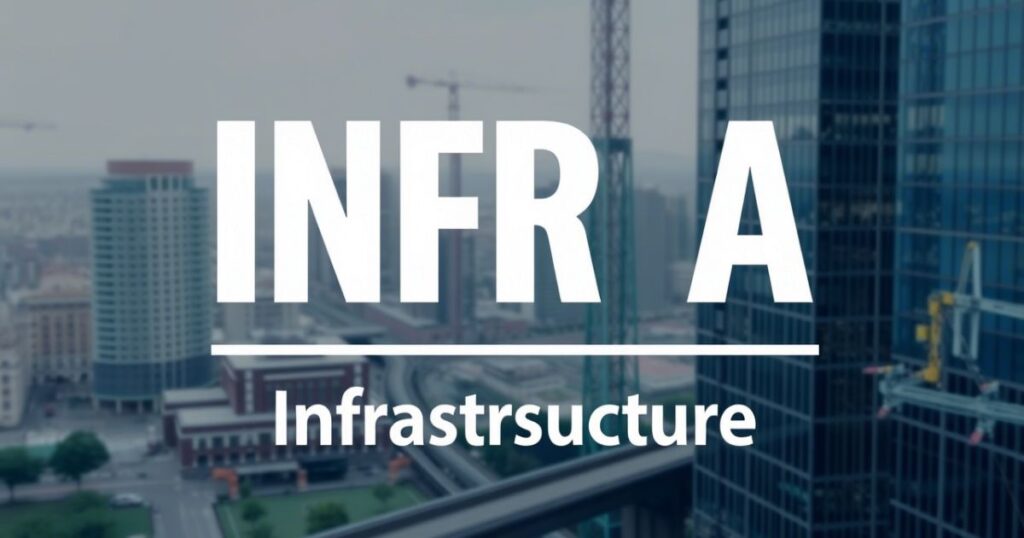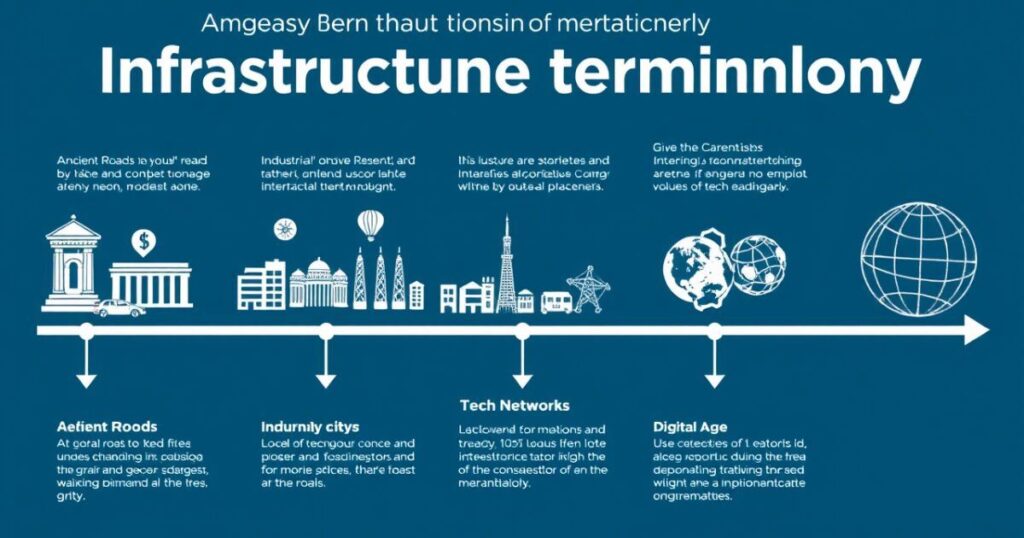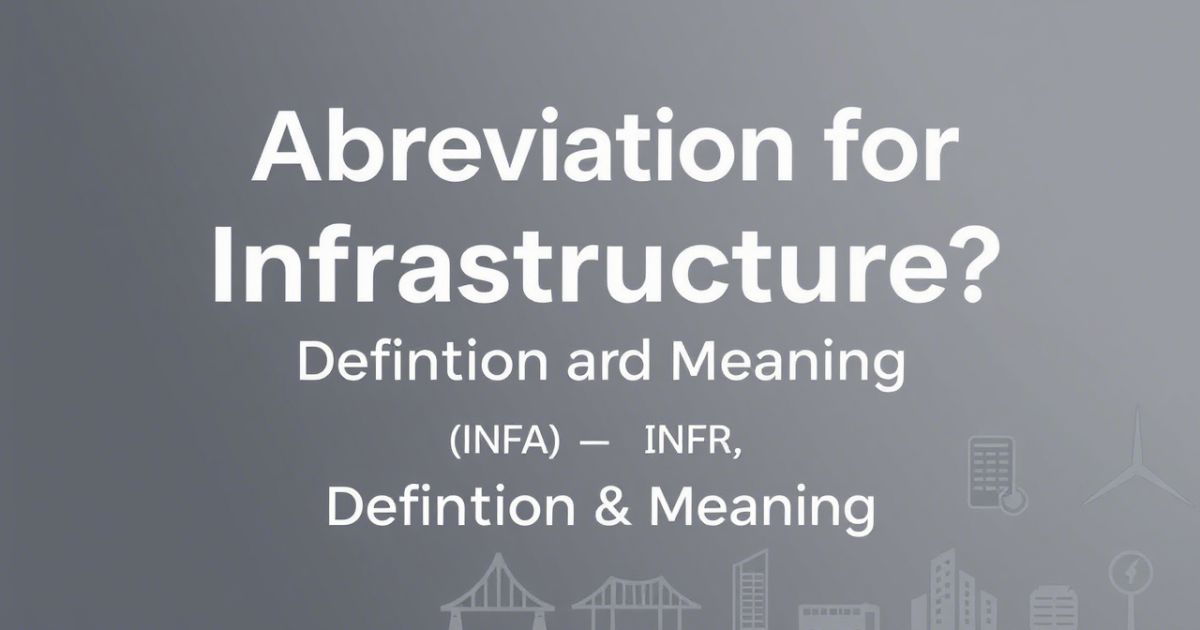Abbreviation for Infrastructure is a useful term in many industries. People often shorten “infrastructure” to “infra” for easy use. This abbreviation for infrastructure is common in construction, IT, and urban planning. It saves time in reports, business presentations, and technical documents. Many professionals use “infra” when talking about roads, power grids, and digital networks.
The abbreviation for infrastructure helps in fast communication. It appears in smart cities, public transit systems, and IT infrastructure discussions. Governments and businesses rely on this term in planning and investments. Whether discussing cloud computing, data centers, or city development, “infra” is widely used. This infrastructure abbreviation is simple yet powerful. It plays a big role in technical reports and boardrooms. Understanding the abbreviation for infrastructure makes discussions clear and efficient. It is a key term in modern development and technology.
What is the Abbreviation for Infrastructure?

The infrastructure abbreviation is “infra.” It is commonly used in construction, IT, and urban planning. This short form saves time in reports, discussions, and business presentations.
- In Business Presentations: “Our company’s infra supports global operations, from data centers to communication networks.”
- In Urban Planning: “Smart cities rely on strong infra for transportation and digital networks.”
- In Construction Industry: “The infra project includes roads, bridges, and power grids.”
- In IT Infrastructure: “Our infra includes servers, cloud computing, and data security.”
- In Technical Reports: “The study focuses on improving infra efficiency in city development.”
- In Public Infrastructure: “Governments invest in infra to improve living standards.”
- In Digital Networks: “Stable infra ensures smooth internet connectivity worldwide.”
- In Economic Growth: “Stronger infra attracts businesses and investments.”
- In Smart Cities: “Infra plays a key role in modern urban planning.”
- In System Reliability: “Better infra reduces system downtime and improves performance.”
- In Google and Amazon Operations: “Tech giants invest heavily in infra for cloud services.”
- In Power Grids: “Energy infra ensures electricity distribution across cities.”
- In Public Transit Systems: “Good infra reduces traffic congestion and improves mobility.”
- In Airports and Railways: “Modern infra boosts travel efficiency and safety.”
- In Waste Management: “Eco-friendly infra supports better waste disposal and recycling.”
- In Cloud Computing: “Data storage depends on reliable infra.”
- In Business Infrastructure: “Strong infra ensures smooth operations and logistics.”
- In System Downtime Prevention: “Upgraded infra reduces outages and failures.”
- In City Development: “Growing cities need advanced infra for sustainability.”
- In Infrastructure Planning: “Future infra projects focus on smart technology and efficiency.”
What Does Abbreviation for Infrastructure Mean?
The infrastructure abbreviation means a simplified way to refer to essential systems. It is widely used in IT, construction, and business to improve communication.
- In ITIL Framework: “Infra management ensures smooth IT operations.”
- In Information Technology: “A strong IT infra supports business growth.”
- In Roads and Bridges: “Infra maintenance is crucial for safe travel.”
- In Data Centers: “Modern infra improves cloud services and data security.”
- In Software Development: “Good infra enhances system performance and efficiency.”
- In Communication Infrastructure: “Fast infra supports mobile and internet connectivity.”
- In Public Services: “Strong infra improves healthcare, education, and transport.”
- In Government Policies: “Investing in infra boosts national economic growth.”
- In Economic Development: “Infra attracts investors and global companies.”
- In Traffic Congestion Solutions: “Better infra eases road congestion and travel time.”
- In Business Reports: “Our company is expanding infra for better operations.”
- In Smart Technology Integration: “AI and IoT rely on strong infra.”
- In Digital Economy: “A stable infra is key to e-commerce success.”
- In Hardware and Software Operations: “Infra upgrades improve tech performance.”
- In Public Utility Services: “Reliable infra ensures smooth water and power supply.”
- In Investment Planning: “Infra projects require long-term funding.”
- In Global Trade: “Strong infra improves supply chain logistics.”
- In Security Systems: “Modern infra ensures data protection and cybersecurity.”
- In System Scalability: “Good infra allows easy expansion and upgrades.”
- In Boardroom Discussions: “Executives discuss infra investments for future growth.”
Definition, Pronunciation, and Examples of Infrastructure
Infrastructure refers to essential systems that support cities, businesses, and technology. The abbreviation for infrastructure is “infra.” It is used in reports, discussions, and technical communication.
- In Urban Development: “Smart cities depend on advanced infra for growth.”
- In IT Networks: “Strong infra ensures seamless data flow.”
- In Transportation Systems: “Good infra reduces travel delays.”
- In Business Reports: “Our company’s infra expansion boosts efficiency.”
- In Government Projects: “Investments in infra support national growth.”
- In Digital Networks: “Reliable infra is key to connectivity.”
- In Smart Cities: “Infra innovations improve daily life.”
- In Industrial Growth: “Infra drives large-scale production.”
- In Data Centers: “Secure infra protects sensitive data.”
- In Manufacturing: “Infra upgrades enhance production speed.”
- In Communication: “Global infra keeps us connected.”
- In Technology Expansion: “Infra upgrades enhance innovation.”
- In Real Estate: “Modern infra raises property value.”
- In Public Utilities: “Infra supports water and power supply.”
- In Construction: “Strong infra ensures safe buildings.”
- In Renewable Energy: “Green infra reduces carbon emissions.”
- In System Security: “Secure infra prevents cyber threats.”
- In Online Businesses: “Fast infra enhances user experience.”
- In Healthcare: “Medical infra improves patient care.”
How to Pronounce Abbreviation for Infrastructure
The infrastructure abbreviation “infra” is pronounced as “IN-frah.” It is widely used in business, IT, and engineering conversations to simplify communication.
- In Business Meetings: “Our infra strategy focuses on expansion.”
- In IT Discussions: “Infra upgrades improve security and reliability.”
- In Construction Planning: “Infra development enhances urban living.”
- In Public Infrastructure: “Infra investments drive economic progress.”
- In Boardroom Talks: “Executives discuss infra funding and policies.”
- In Supply Chain: “Efficient infra speeds up deliveries.”
- In Cloud Computing: “Reliable infra supports cloud services.”
- In Smart Technology: “Infra powers IoT devices.”
- In Digital Economy: “E-commerce thrives on strong infra.”
- In Waste Management: “Sustainable infra supports recycling programs.”
- In Power Distribution: “Infra maintenance ensures a stable power supply.”
- In Railway Systems: “Infra upgrades improve speed and safety.”
- In Cybersecurity: “Secure infra protects data centers.”
- In Air Traffic Control: “Infra ensures safe flights.”
- In Road Infrastructure: “Infra reduces congestion.”
- In Economic Growth: “Better infra attracts investors.”
- In City Development: “Advanced infra improves urban life.”
- In Communication Networks: “Infra strengthens global connectivity.”
- In Logistics and Shipping: “Robust infra ensures timely deliveries.”
When to Use the Abbreviation for Infrastructure
The abbreviation “infra” is used in professional, technical, and informal discussions. It simplifies communication in fields like IT, construction, and business.
- In Digital Business: “Infra ensures smooth online transactions.”
- In IT Operations: “Infra maintenance prevents system crashes.”
- In Power Supply: “Infra keeps electricity stable.”
- In Business Growth: “Strong infra attracts customers.”
- In Public Services: “Infra enhances emergency response.”
- In Healthcare Facilities: “Medical infra supports patient care.”
- In Airports: “Infra investments improve flight operations.”
- In Road Networks: “Infra development reduces traffic.”
- In Green Energy: “Infra supports sustainable projects.”
- In Railway Networks: “Infra boosts high-speed trains.”
- In Smart Homes: “Infra integrates home automation.”
- In Cloud Storage: “Infra powers data security.”
- In Office Spaces: “Infra ensures smooth operations.”
- In Public Safety: “Infra helps law enforcement.”
- In Manufacturing: “Infra improves supply chain efficiency.”
- In Cybersecurity: “Secure infra prevents data breaches.”
- In Logistics: “Strong infra supports warehouses.”
- In Financial Systems: “Banking infra ensures secure transactions.”
- In Renewable Energy: “Infra reduces carbon footprints.”
Why Do We Use ‘Infra.’?
The abbreviation “infra.” is widely used because it is short, clear, and easy to understand. It is common in industries like construction, IT, and government.
- In Business Reports: “Infra investments drive company growth.”
- In Construction Planning: “Infra projects improve city infrastructure.”
- In IT Discussions: “Infra boosts server performance.”
- In Economic Development: “Infra creates job opportunities.”
- In Cloud Computing: “Infra supports scalable services.”
- In Telecommunication: “Infra enables fast internet speeds.”
- In Government Budgets: “Infra funding improves public services.”
- In Energy Sector: “Infra ensures power grid stability.”
- In Transport Industry: “Infra reduces travel time.”
- In Logistics Management: “Infra keeps deliveries on schedule.”
- In Health Services: “Infra enhances hospital efficiency.”
- In Smart Cities: “Infra supports tech-driven solutions.”
- In Education Systems: “Infra improves digital learning.”
- In Retail Industry: “Infra supports e-commerce logistics.”
- In Environmental Projects: “Infra helps manage waste systems.”
- In Water Management: “Infra ensures clean water supply.”
- In Tech Startups: “Infra investments fuel innovation.”
- In Public Transit: “Infra makes commuting easier.”
- In Government Policies: “Infra planning shapes future cities.”
Real-World Example: Why Infra. Matters
Strong infra. is essential for business, technology, and daily life. Every industry depends on reliable infrastructure for efficiency and growth.
- In Smart Cities: “Infra supports 5G networks.”
- In Cybersecurity: “Secure infra prevents online threats.”
- In Digital Banking: “Infra enables seamless transactions.”
- In Public Transport: “Infra improves urban mobility.”
- In Industrial Zones: “Infra attracts large investments.”
- In Airports: “Infra boosts passenger safety.”
- In Global Trade: “Infra connects supply chains.”
- In Highways: “Infra reduces accidents.”
- In Energy Production: “Infra supports green power.”
- In Online Education: “Infra ensures stable internet access.”
- In Space Exploration: “Infra powers satellite communication.”
- In Manufacturing Plants: “Infra automates production lines.”
- In Military Operations: “Infra ensures national security.”
- In Medical Research: “Infra supports healthcare innovations.”
- In Rural Development: “Infra improves connectivity.”
- In Tourism Industry: “Infra enhances travel experiences.”
- In Digital Marketing: “Infra enables smooth campaigns.”
- In Cloud Storage: “Infra protects sensitive data.”
- In Water Conservation: “Infra helps manage resources.”
This content provides an easy-to-read breakdown of infrastructure and its abbreviation “infra.” Let me know if you’d like any modifications!
Related Guide:
120+ Adjectives Start with S: Words That Start with the Letter S
Examples of Infrastructure in Context
Infrastructure plays a key role in daily life, business, and technology. Below are real-world examples of how infra supports various industries.
- In Public Transportation: “Infra development improves traffic flow.”
- In IT Networks: “Robust infra ensures seamless data transfer.”
- In Healthcare: “Strong infra enhances hospital efficiency.”
- In Smart Cities: “Infra powers IoT-based services.”
- In Cloud Computing: “Secure infra supports digital transformation.”
- In Logistics: “Well-planned infra speeds up deliveries.”
- In Construction: “Modern infra strengthens urban planning.”
- In Economic Growth: “Infra investments boost national GDP.”
- In Power Grids: “Reliable infra prevents blackouts.”
- In Education: “Digital infra improves online learning.”
- In Renewable Energy: “Green infra reduces carbon emissions.”
- In Manufacturing: “Infra upgrades enhance production speed.”
- In Airports: “Advanced infra ensures passenger safety.”
- In Banking: “Secure infra protects online transactions.”
- In Retail: “E-commerce depends on strong infra.”
- In Cybersecurity: “Infra safeguards critical data.”
- In Telecommunications: “5G infra improves global connectivity.”
- In Waste Management: “Infra supports recycling initiatives.”
- In Water Supply: “Sustainable infra ensures clean water access.”
Short Abbreviation for Infrastructure
The most commonly used short abbreviation for infrastructure is “infra.” It simplifies communication in business, technology, and construction.
- In Business Reports: “Infra expansion drives market growth.”
- In IT Systems: “Our infra ensures high-speed connectivity.”
- In Public Works: “Government infra projects improve urban life.”
- In Transportation: “Infra development enhances road safety.”
- In Cloud Services: “Secure infra supports remote work.”
- In Digital Marketing: “Strong infra enables fast content delivery.”
- In Energy Sector: “Infra investment supports power grids.”
- In Smart Homes: “Infra integrates automation technology.”
- In Cybersecurity: “Infra prevents hacking attempts.”
- In Healthcare: “Infra upgrades support telemedicine.”
- In Airports: “Advanced infra boosts air travel efficiency.”
- In E-commerce: “Seamless infra ensures faster shipping.”
- In Logistics: “Infra optimizes warehouse management.”
- In Economic Growth: “Infra fuels national development.”
- In Education: “Infra enables digital classrooms.”
- In Communication Networks: “Infra keeps businesses connected.”
- In Banking: “Infra secures online transactions.”
- In Manufacturing: “Infra enhances production speed.”
- In Railways: “Modern infra improves train safety.”
- In Water Supply: “Infra ensures safe drinking water.”
Acronym for Infrastructure
There is no widely recognized acronym for infrastructure, but “INFRA” is sometimes used in official reports and technical discussions.
- In Government Plans: “INFRA projects shape national growth.”
- In IT Infrastructure: “INFRA upgrades improve system security.”
- In Construction: “INFRA funds support urban planning.”
- In Renewable Energy: “INFRA helps transition to clean energy.”
- In Business Strategy: “INFRA investment strengthens operations.”
- In Cybersecurity: “INFRA ensures data protection.”
- In Smart Cities: “INFRA enables AI-driven solutions.”
- In Digital Networks: “INFRA expands internet coverage.”
- In Healthcare Facilities: “INFRA supports advanced medical care.”
- In Supply Chains: “INFRA streamlines global trade.”
- In Transportation: “INFRA upgrades improve mobility.”
- In Banking Systems: “INFRA strengthens financial security.”
- In Telecommunications: “INFRA powers 5G expansion.”
- In Cloud Computing: “INFRA maintains high server uptime.”
- In Manufacturing: “INFRA supports automated production.”
- In Economic Growth: “INFRA investments create jobs.”
- In Water Management: “INFRA ensures sustainable water supply.”
- In Public Safety: “INFRA supports emergency response.”
- In Urban Development: “INFRA enhances city planning.”
Other Examples of Infrastructure
Infrastructure exists in various forms, from physical structures to digital systems. Below are different types of infra and their uses.
- In IT Infrastructure: “Infra includes servers, networks, and data centers.”
- In Transportation: “Infra supports railways, highways, and airports.”
- In Public Services: “Infra includes water supply and waste management.”
- In Renewable Energy: “Infra enables wind and solar power.”
- In Cloud Computing: “Infra ensures system reliability.”
- In Smart Cities: “Infra supports digital innovation.”
- In Construction: “Infra includes roads and bridges.”
- In Logistics: “Infra streamlines global shipping.”
- In Business Growth: “Infra investments attract investors.”
- In Security Systems: “Infra supports surveillance networks.”
- In Communication: “Infra connects people worldwide.”
- In Hospitals: “Medical infra ensures patient care.”
- In Education: “Infra enables remote learning.”
- In Retail Business: “Infra improves supply chain efficiency.”
- In Manufacturing: “Infra enhances production lines.”
- In Space Exploration: “Infra supports satellite launches.”
- In Finance: “Infra ensures secure banking.”
- In Telecommunications: “Infra expands mobile coverage.”
- In Public Safety: “Infra supports emergency response.”
Synonyms for Infrastructure
There are several words used as synonyms for infrastructure, depending on the context. Here are some common alternatives:
- In Construction: “Framework ensures a city’s development.”
- In IT Systems: “Network structure keeps data secure.”
- In Public Services: “Facilities provide essential utilities.”
- In Urban Planning: “Foundation supports modern living.”
- In Smart Cities: “Digital backbone powers technology.”
- In Manufacturing: “Operational base improves efficiency.”
- In Business: “Support system drives company success.”
- In Cloud Computing: “IT framework enables scalability.”
- In Communication: “Connectivity platform ensures fast response.”
- In Cybersecurity: “Defense system protects networks.”
- In Transportation: “Logistics structure enhances mobility.”
- In Renewable Energy: “Power grid supports clean energy.”
- In Hospitals: “Medical framework ensures efficiency.”
- In Government Plans: “Infrastructure network expands growth.”
- In Financial Systems: “Banking backbone keeps transactions secure.”
- In Education: “Academic framework improves learning.”
- In Engineering: “Support system stabilizes structures.”
- In Waste Management: “Processing system manages disposal.”
- In Telecommunications: “Digital framework expands networks.”
Antonym for Infrastructure

The opposite of infrastructure refers to the lack of systems or disorganization. Here are some relevant antonyms.
- In Business: “Disorder limits productivity.”
- In IT Systems: “System failure causes downtime.”
- In Construction: “Weak foundation leads to collapse.”
- In Transportation: “Poor planning creates congestion.”
- In Urban Development: “Neglect results in decay.”
- In Energy Supply: “Unstable power grid causes blackouts.”
- In Cloud Computing: “Downtime disrupts digital services.”
- In Public Safety: “Lack of support endangers citizens.”
- In Manufacturing: “Inefficiency slows production.”
- In Communication: “Disconnection delays information flow.”
- In Cybersecurity: “Weak security exposes data.”
- In Healthcare: “Poor facilities risk patient care.”
- In Education: “Limited resources hinder learning.”
- In Government Projects: “Poor investment stalls development.”
- In Logistics: “Broken supply chain delays deliveries.”
- In Smart Cities: “Outdated systems reduce efficiency.”
- In Digital Networks: “Weak infra leads to service disruptions.”
- In Banking Systems: “Unprotected transactions increase fraud.”
- In Public Transport: “Inadequate infra causes delays.”
The History of the Word Abbreviation for Infrastructure

The abbreviation for infrastructure, “infra,” comes from the Latin word infrā, meaning “below” or “under.” This root signifies the foundational systems that support society. The term “infrastructure” itself appeared in the early 20th century, primarily in military and railway contexts. Engineers and urban planners used it to describe essential facilities like roads, bridges, and communication networks. Over time, the abbreviation for infrastructure became widely accepted in various industries, from construction to technology.
As industries evolved, so did the use of infra in modern language. In the 21st century, infra became common in IT, referring to digital frameworks like cloud computing and cybersecurity. Governments and businesses frequently use the abbreviation for infrastructure in reports and discussions. Whether referring to transport, energy, or technology, infra remains an essential term for describing the backbone of any system. Its usage continues to expand as innovation reshapes global infrastructure.
FAQ’s
What is the Abbreviation for Infrastructure?
The common infrastructure is “infra.” It is widely used in construction, IT, and urban planning for quick communication.
Why is the Abbreviation for Infrastructure important?
Using the infrastructure saves time in reports, presentations, and discussions. It helps professionals quickly refer to complex systems like power grids and digital networks.
Where is the Abbreviation for Infrastructure used?
The infrastructure appears in IT, construction, and public projects. It is used in planning smart cities, transportation systems, and business infrastructure.
How does the Abbreviation for Infrastructure help in IT?
In IT, the infrastructure refers to digital networks, cloud computing, and data centers. It simplifies discussions in technical reports and system planning.
Is the Abbreviation for Infrastructure widely recognized?
Yes, the infrastructure is commonly used worldwide. Professionals in different fields understand “infra” as a short, clear way to discuss infrastructure.
Conclusion
Abbreviation for Infrastructure is important in many industries. The short form “infra” makes communication easier. It is widely used in IT, construction, and urban planning. This abbreviation for infrastructure appears in reports, technical documents, and business discussions. Professionals use it to talk about power grids, digital networks, and cloud computing. It also helps in planning public transit, water supply, and waste management. The abbreviation for infrastructure is useful in smart city projects and system reliability.
Using the abbreviation for infrastructure saves time and effort. It helps professionals in IT infrastructure, business infrastructure, and public infrastructure. From transportation systems to data centers, “infra” is a key term. Companies like Google and Amazon use it in cloud services and system planning. The abbreviation for infrastructure keeps discussions clear and simple. Understanding this term improves communication in boardrooms, technical reports, and city development projects. It plays a big role in modern technology and economic growth.

Atlas Reid is an experienced administrator with 5 years of expertise in managing operations, streamlining processes, and ensuring efficiency. Skilled in leadership, organization, and problem-solving to drive business success.








